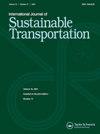A SWOT analysis of stakeholder perspectives on the strategic application of economic sustainability indicators in Ghana’s road infrastructure development
IF 3.9
3区 工程技术
Q2 ENVIRONMENTAL STUDIES
International Journal of Sustainable Transportation
Pub Date : 2025-05-04
DOI:10.1080/15568318.2025.2496894
引用次数: 0
Abstract
This study explores the economic criterion indicators for sustainable road and highway infrastructure development in Ghana through a phenomenological research approach. Using SWOT analysis and semi-structured interviews with 14 key stakeholders, including government officials, academics, and private sector professionals, the research examines four critical economic indicators: material costs, lifecycle costs, construction time, and maintenance and operation costs Through content analysis using ATLAS.ti 9 software, the study evaluates internal strengths and weaknesses, as well as external opportunities and threats affecting each indicator’s implementation. The findings reveal multifaceted challenges including insufficient expertise in lifecycle cost analysis, inadequate maintenance funding, weak regulatory enforcement, and political interference. The study identifies strategic action plans for each indicator, including local material sourcing, improved procurement practices, capacity building initiatives, enhanced stakeholder collaboration, and technological integration. These recommendations are supported by specific deliverables and expert remarks that provide practical implementation guidance. This research contributes to sustainable infrastructure development theory and practice by providing a comprehensive framework for economic sustainability in Ghana’s road and highway sector. While the study’s geographical focus may limit generalisability, it offers valuable insights for policymakers and practitioners in developing countries facing similar challenges. The findings suggest that the successful implementation of economic sustainability indicators requires a coordinated approach combining technical expertise, policy reform, and stakeholder engagement, while considering local contextual factors.
加纳道路基础设施发展中经济可持续性指标战略应用的利益相关者视角SWOT分析
本研究通过现象学研究方法探讨了加纳可持续道路和公路基础设施发展的经济标准指标。利用SWOT分析和对14个主要利益相关者(包括政府官员、学者和私营部门专业人士)的半结构化访谈,研究考察了四个关键的经济指标:材料成本、生命周期成本、建设时间、维护和运营成本。在Ti 9软件中,该研究评估了内部优势和劣势,以及影响每个指标实施的外部机会和威胁。调查结果揭示了多方面的挑战,包括生命周期成本分析方面的专业知识不足、维护资金不足、监管执行不力以及政治干预。该研究确定了每个指标的战略行动计划,包括当地材料采购、改进采购实践、能力建设倡议、加强利益相关者合作和技术整合。这些建议得到了具体可交付成果和专家意见的支持,提供了实际的实施指导。本研究通过为加纳道路和高速公路部门的经济可持续性提供一个全面的框架,为可持续基础设施发展的理论和实践做出了贡献。虽然该研究的地理重点可能会限制其普遍性,但它为面临类似挑战的发展中国家的决策者和实践者提供了有价值的见解。研究结果表明,经济可持续性指标的成功实施需要结合技术专长、政策改革和利益相关者参与的协调方法,同时考虑当地环境因素。
本文章由计算机程序翻译,如有差异,请以英文原文为准。
求助全文
约1分钟内获得全文
求助全文
来源期刊
CiteScore
8.90
自引率
2.60%
发文量
56
期刊介绍:
The International Journal of Sustainable Transportation provides a discussion forum for the exchange of new and innovative ideas on sustainable transportation research in the context of environmental, economical, social, and engineering aspects, as well as current and future interactions of transportation systems and other urban subsystems. The scope includes the examination of overall sustainability of any transportation system, including its infrastructure, vehicle, operation, and maintenance; the integration of social science disciplines, engineering, and information technology with transportation; the understanding of the comparative aspects of different transportation systems from a global perspective; qualitative and quantitative transportation studies; and case studies, surveys, and expository papers in an international or local context. Equal emphasis is placed on the problems of sustainable transportation that are associated with passenger and freight transportation modes in both industrialized and non-industrialized areas. All submitted manuscripts are subject to initial evaluation by the Editors and, if found suitable for further consideration, to peer review by independent, anonymous expert reviewers. All peer review is single-blind. Submissions are made online via ScholarOne Manuscripts.

 求助内容:
求助内容: 应助结果提醒方式:
应助结果提醒方式:


